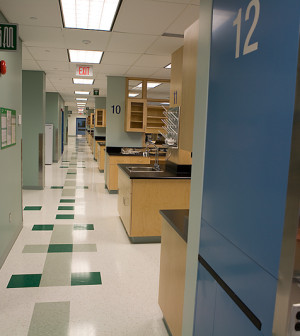- 8 Ways to Increase Dopamine Naturally
- 7 Best Breads for Maintaining Stable Blood Sugar
- Gelatin vs. Collagen: Which is Best for Skin, Nails, and Joints?
- The Long-Term Effects of Daily Turmeric Supplements on Liver Health
- Could Your Grocery Store Meat Be Causing Recurring UTIs?
- Are You Making This Expensive Thermostat Error This Winter?
- Recognizing the Signs of Hypothyroidism
- 10 Strategies to Overcome Insomnia
- Could Artificial Sweeteners Be Aging the Brain Faster?
- Techniques for Soothing Your Nervous System
Chemo for Advanced Breast Cancer Might Be Enough


After chemotherapy, surgery and radiation to treat the original tumor might not benefit women with advanced breast cancer, a new study shows.
A minority of women with breast cancer discover they have the disease in its later stages, after it has spread to other parts of the body. These patients typically are started on chemotherapy to help shrink the cancerous growths and slow the disease’s progress.
Beyond that, doctors have long wondered whether it’s also a good idea to treat the original breast tumor with surgery or radiation even though the cancer has taken root in other organs.
“Our trial did show there’s no benefit of doing surgery,” said study author Dr. Rajendra Badwe, head of the surgical breast unit at Tata Memorial Hospital in Mumbai, India.
It didn’t seem to matter if patients were young or old, if their cancer was hormone receptor positive or negative, or if they had a few sites of spreading cancer or a lot. Surgery didn’t prolong their lives.
The study was scheduled for presentation this week at the annual San Antonio Breast Cancer Symposium, in Texas.
The results aren’t shocking, since experiments in animals performed more than 30 years ago suggested that cutting out the primary tumor only egged on cancer at the secondary sites.
But studies in humans have suggested that removing the original cancer in the breast may increase survival. Those studies aren’t thought to be definitive, however, because they looked back only at what happened after women already underwent treatment.
One expert not involved in the new study also questioned the selection of patients in the previous research.
“There’s a lot of bias with that because you tend to operate on patients you think might do well to begin with,” said Dr. Stephanie Bernik, chief of surgical oncology at Lenox Hill Hospital in New York City. “We definitely need more evidence to guide us.”
To collect that evidence, researchers randomly assigned 350 women who responded to their initial chemotherapy to one of two courses of treatment. The first group had surgery followed by radiation to remove the original breast tumor and lymph nodes under the arms. The second group received only observation and appropriate medication.
After an average of 17 months of follow-up, there was essentially no difference in survival between the women who had their original tumors removed and those who had not. There were 111 deaths in the group that had their breast cancers cut out compared to 107 deaths in the group that did not.
Badwe said there is a tradeoff in these patients.
Surgery and radiation can clear the tumor from the breast. That can be a big benefit for women who are bothered because they can feel the mass or if it has become ulcerated or broken through the skin, she said.
But as in those early animal studies, Badwe and his team found that cutting out the breast tumor seemed to increase the growth of cancer at distant sites.
“This is the first human study to show that,” he said.
Badwe said it’s not clear why or how the primary tumor might control overall cancer growth. He said other studies would need to examine that.
Another cancer expert said more research is needed to settle the issue.
“I applaud the authors for doing this, but I don’t think this is the last word,” said Dr. Richard Bleicher, a breast surgeon at Fox Chase Cancer Center in Philadelphia.
Bleicher said the relatively small number of patients didn’t give the study enough power to show clear differences between the treatment options.
A larger trial funded by the U.S. National Cancer Institute, which plans to enroll nearly 900 patients, is looking into the same question, he said. That study isn’t due to wrap up until 2025, so it might be a while before doctors have more robust evidence.
Studies presented at medical conferences are considered preliminary since they have not yet had the independent scrutiny required for publication in most medical journals.
More information
For more information on metastatic breast cancer, visit the U.S. National Cancer Institute .
Source: HealthDay
Copyright © 2026 HealthDay. All rights reserved.










